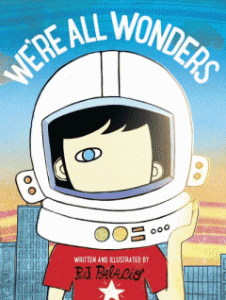
We’re All Wonders
We’re All Wonders
R.J. Palacio
Puffin, 2017
32pp., pbk., RRP $A16.99
9780141386416
Wonder is the unforgettable story of August Pullman, an ordinary boy with an extraordinary face that has touched readers all over the world as it became an instant classic, used widely for one-school-one read projects and spread through word-of-mouth recommendations. Now Palacio has transformed the core message of that book into a picture book that transcends ages with its powerful theme.
Even though he does ordinary things like riding a bike, eating ice cream and playing ball, Auggie is not an ordinary kid because he does not look like all the other kids in his class. He knows this and he knows they point and laugh and call him names which hurt his feelings. But he and his dog Daisy have a remarkable strategy for dealing with things when they get tough… And it certainly puts the hurt into perspective.
Even though he knows he can’t change the ways he looks, perhaps he can change the way people see.
Echoing the cover of the original, Palacio has depicted Auggie has a one-eyed child wearing a bright red t-shirt which stands out like a beacon against the more muted tones of the illustrations, somewhat like Auggie himself standing out amongst the masses. And for someone with no face, Palacio has nevertheless managed to convey a whole range of emotions in the illustrations and text. Every word does a job.
In a book full of messages about belonging and acceptance perhaps the strongest one is Auggie’s inner strength. Yes his feelings are hurt but he has learned through his family’s love and acceptance of him as he is that he has the strength to endure, maybe even overcome the insults and prejudices. Even though he needs time out to heal, he has the resilience to come back stronger than ever. He knows he is a wonder, he is unique – but then, aren’t we all?
Those who have not read the novel do not need to do so in order to connect to this book (although this one may well inspire them to seek it out) because it’s message is more important than the character. Every one of us is an Auggie in some way – try being a red-head with freckles and glasses in the 50s when Marilyn Monroe-types were the role models – so every one of us could be the central character. Written sensitively and with a light hand, particularly when it comes to Auggie’s solution, this book should be at the core of any program focusing on mindfulness, well-being, inclusivity, acceptance of others and being enough just as we are. Perhaps this book will, indeed, bring Auggie’s hope of changing how people see to fruition.